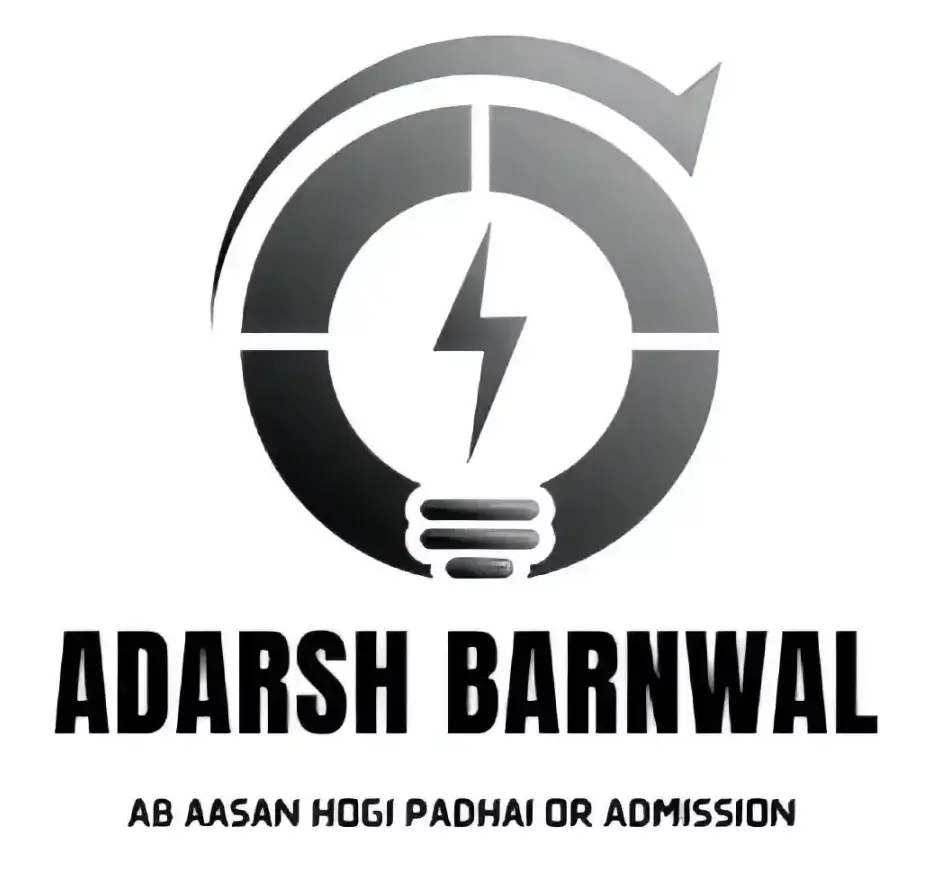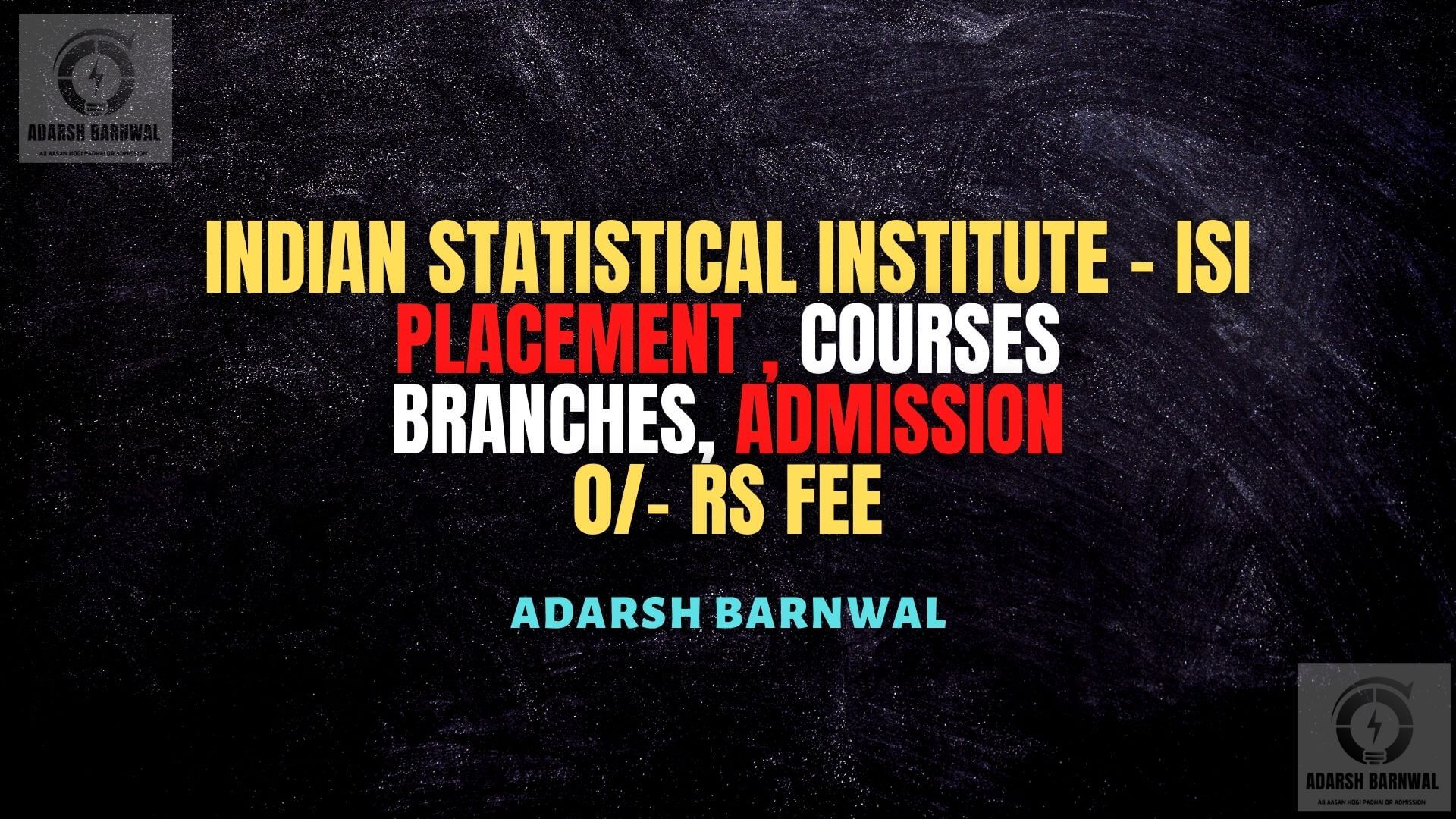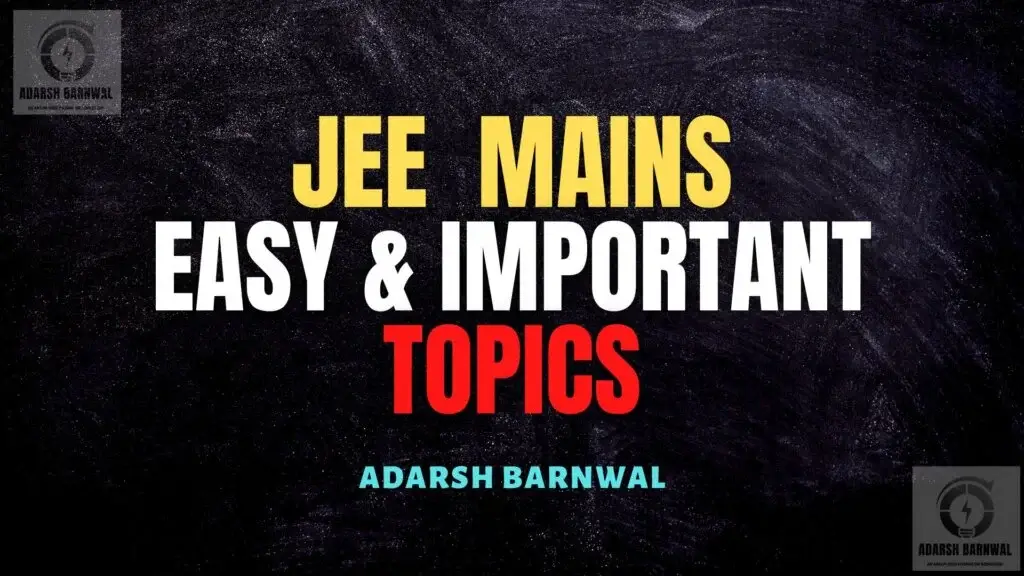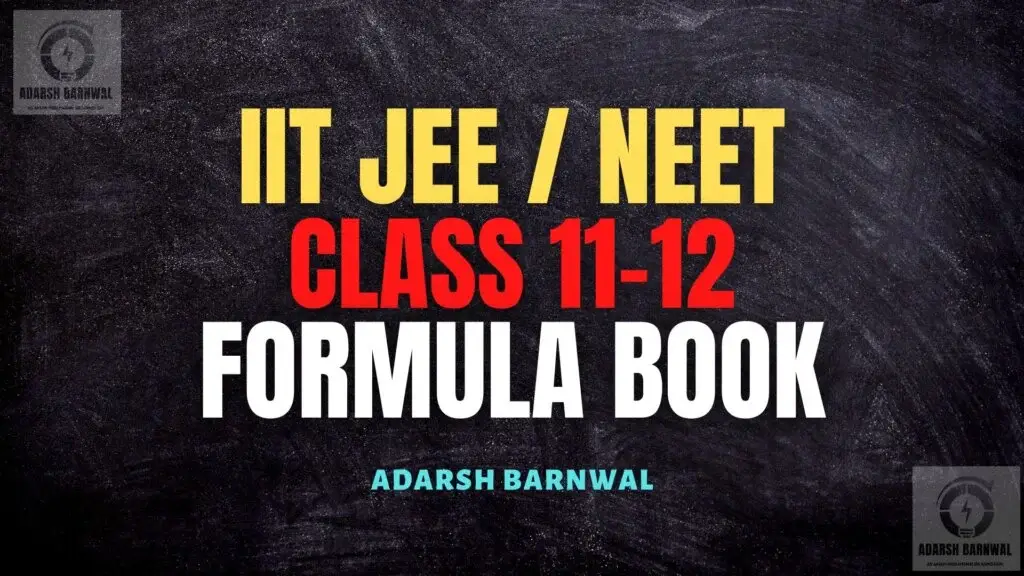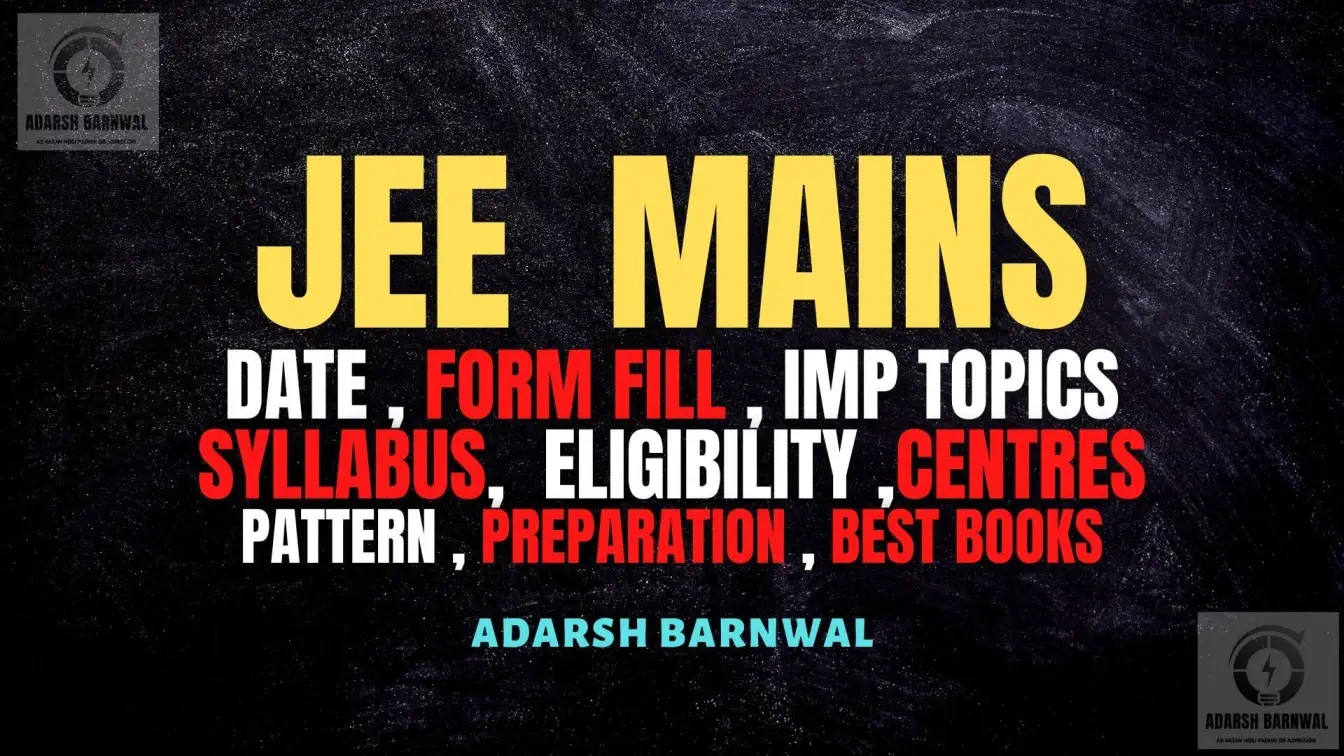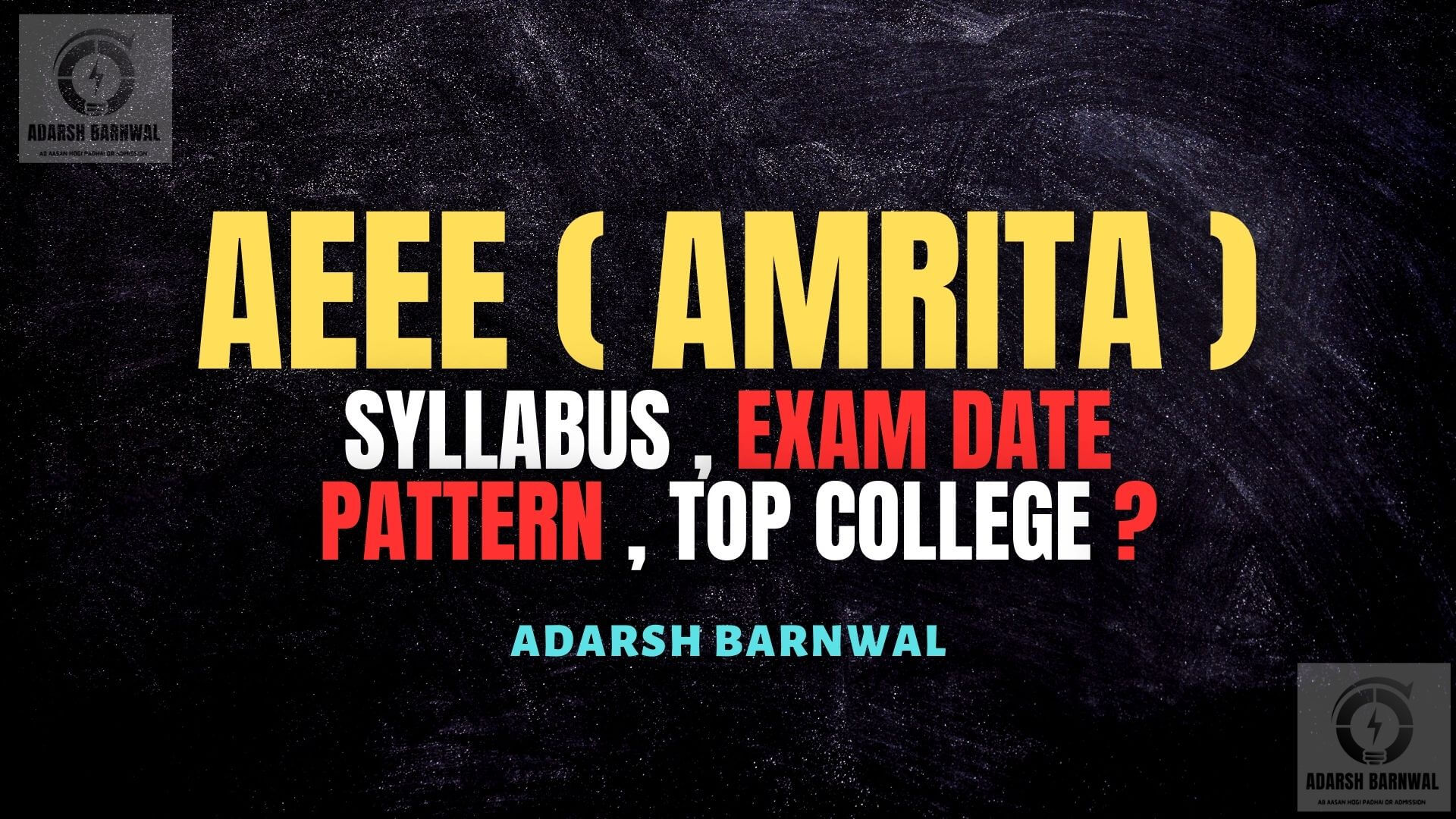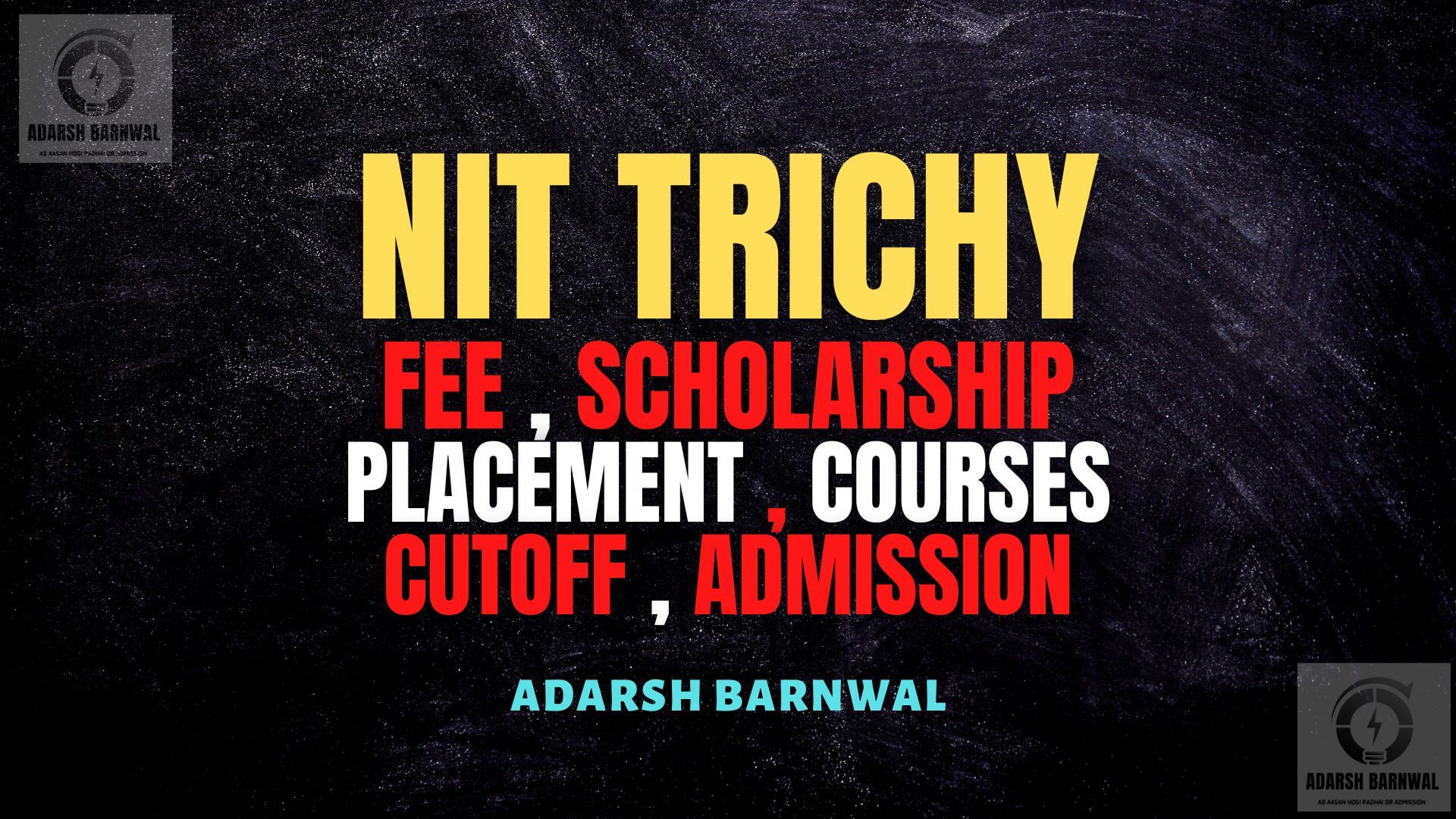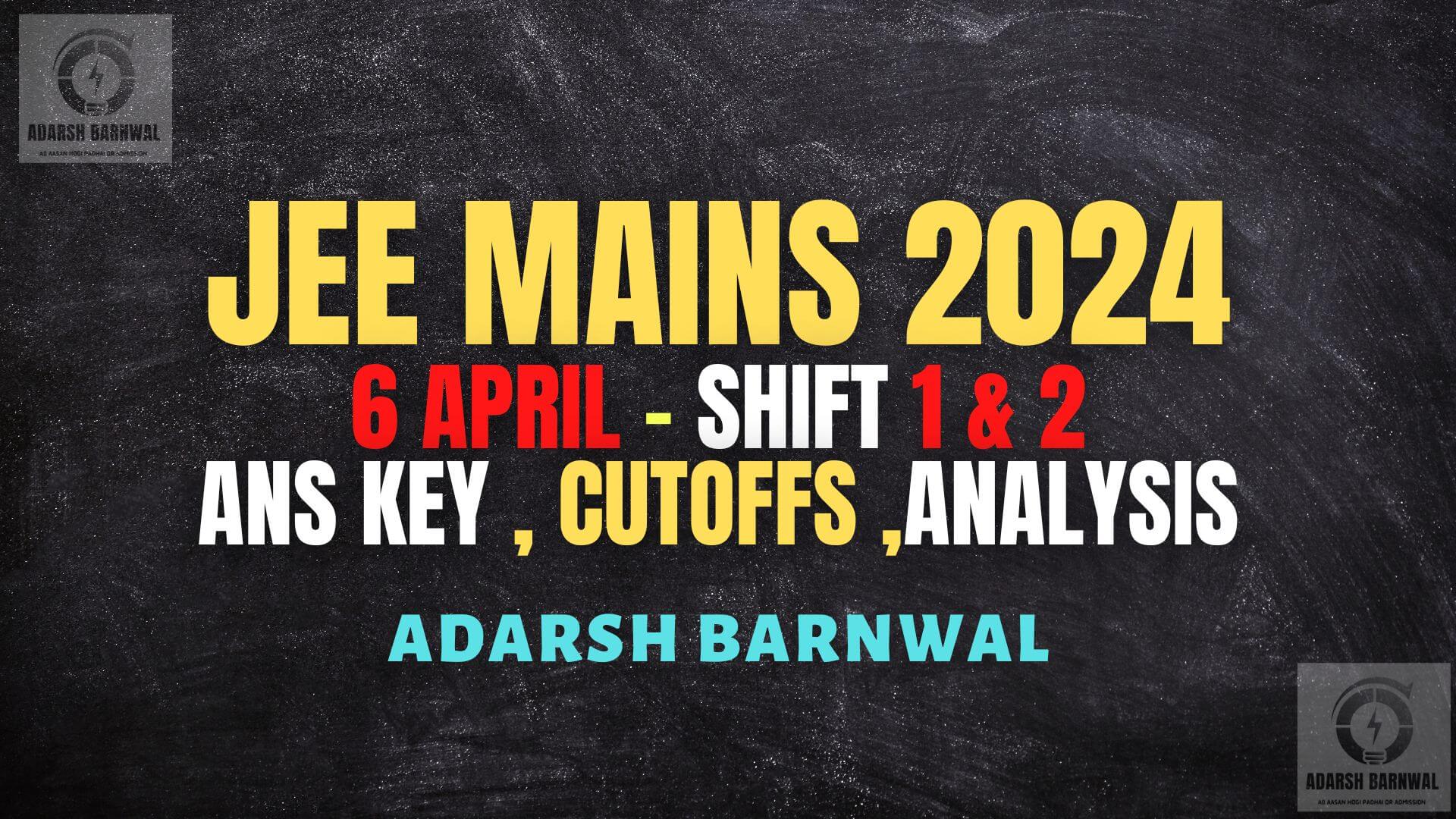Indian Statistical Institute (ISI) is a higher education and research institute which is recognized as an Institute of National Importance by the 1959 act of the Indian parliament. It grew out of the Statistical Laboratory set up by Prasanta Chandra Mahalanobis in Presidency College, Kolkata. Established in 1931, this unique institution of India is one of the oldest institutions focused on statistics, and its early reputation led it to being adopted as a model for the first US institute of statistics set up at the Research Triangle, North Carolina by Gertrude Mar Cox. Isi admission test will held on 12 May
Primary activities of ISI are research and training of statistics, development of theoretical statistics and its applications in various natural and social sciences. Originally affiliated with the University of Calcutta, the institute was declared an institute of national importance in 1959, through an act of Indian parliament, Indian Statistical Institute act, 1959. ISI functions under the Ministry of Statistics and Programme Implementation (MOSPI) of the government of India.
Key areas of expertise of ISI are statistics, computer science, mathematics, mathematical economics, operations research and information science and it is one of the few research oriented Indian schools offering courses at both the undergraduate and graduate level.
Top engineering Exams in India – Apply Now
| Nit Details | Top Private College | IIIT Details | Government College Details | IIT Details | Gfti Details |
|---|---|---|---|---|---|
| Click | Click | Click | Click | Click | Click |
ISI EXAM DATES
ISI admission test will be held on 12 May, 2024
| Events | Dates 2024 (Tentative) |
| Notification availability | February/ March 2024 |
| Release of application | 1st/ 2nd week of March 2024 |
| Last date to apply & pay fee | 2nd week of April 2024 |
| Availability of admit card | 4th week of April 2024 |
| ISI Exam | 12 May 2024 |
| Release of answer key | May/ June 2024 |
| Submission of objections | June 2024 |
| Availability of result | June/ July 2024 |
| Admission list releases | July/ August 2024 |
ISI Branches
ISI has its headquarters in Baranagar, West Bengal. It has four subsidiary centres focused in academics at Delhi, Bengaluru, Chennai and Tezpur, and a branch at Giridih. In addition, the institute has a network of units of statistical quality control and operations research at Vadodara, Giridih, Hyderabad, Mumbai and Pune engaged in guiding the industries, within and outside India, in developing the most up–to–date quality management systems and solving critical problems of quality, reliability and productivity.
| Institute / Center | City | State | Founded | Type | Website |
|---|---|---|---|---|---|
| ISI Kolkata | Kolkata | West Bengal | 1931 | Institute and HQ | isical.ac.in/ |
| ISI Delhi | New Delhi | Delhi | 1974 | Institute | isid.ac.in/ |
| ISI Bangalore | Bengaluru | Karnataka | 1966 | Institute | isibang.ac.in/ |
| ISI Tezpur | Tezpur | Assam | 2011 | Institute | isine.ac.in/ |
| ISI Chennai | Chennai | Tamil Nadu | 1960 | Centre | isichennai.res.in/ |
ISI Admission
The Indian Statistical Institute (ISI) conducts the Indian Statistical Institute Admission Test abbreviated as ISI Admission Test in order to offer students admission in undergraduate and postgraduate courses which are offered at the ISI. Admission to the academic programmes offered at the ISI Kolkata is strictly based on the merits obtained by the candidates which are evaluated from their performance in ISI admission tests and interviews.
The past academic records of the candidate may also be taken into account for the purpose of performance evaluation. In 2022 the ISI admission test is held at 38 Centres across the country. The ISI admission test is a national-level entrance exam and the mode of the exam is offline i.e. pen and paper test.
ISI Admission Test Exam Highlights
The following table brings the important details of the ISI Admission Test 2024.
| Particulars | Details |
|---|---|
| Name of Entrance Exam | Indian Statistical Institute (ISI) Admission Test |
| Conducting Body | ISI Calcutta |
| Exam Level | Undergraduate and Postgraduate |
| Exam Frequency | Once a year |
| Exam Mode | Offline (Pen and Paper Test) |
| Courses Offered Through ISI Admission Test | BStat, BMath, MStat, MMath |
| ISI Admission Test Application Fee | Male (General) candidates – INR 1,500 Female (General) candidates – INR 1,000 SC, ST, OBC-NCL, EWS, PwD candidates – INR 750 |
| Exam Medium | English |
| Exam Duration | 2 Hours |
| Total Marks | 100 |
| Number of Exam Cities | 38 |
| Official Website | https://www.isical.ac.in/~admission/ |
| Contact Details | [email protected] |
Top engineering Exams in India – Apply Now
| Nit Details | Top Private College | IIIT Details | Government College Details | IIT Details | Gfti Details |
|---|---|---|---|---|---|
| Click | Click | Click | Click | Click | Click |
ISI Admission Test 2025 Application Form
When seeking admissions at ISI, the very first step is to apply online for registration and appear for the entrance examination. Aspirants need to fill the application form online on the official website. The ISI Admission Test 2025 application form will have to be filled online for the entrance exam for PG course admissions they need to register on the admissions portal. Candidates will also have to upload their photograph, signature and category certificate in the specific resolutions. The application fee has to be paid in Credit/Debit Card and Net Banking modes.

Courses offered through ISI Admission Test
The following courses are offered through the ISI Admission Test.
| B Stat | B Math |
| M Math | M.S (QE) |
| M.S (QMS) | MTech (CS) |
| M Stat | M.S (LIS) |
| MTech (QROR) | JRF in Statistics |
| JRF in Mathematics | JRF in Quantitative Economics |
| JRF in Computer Science | JRF in Quality, Reliability and Operations Research |
| JRF in Physics | JRF in Library and Information Science |
| JRF in Sociology | JRF in Geology |
| JRF in Psychology | JRF in Agricultural Chemistry and Soil Science |
| JRF in Linguistics | PG Diploma in Statistical Methods and Analytics |
| PG Diploma in Computer Applications | |
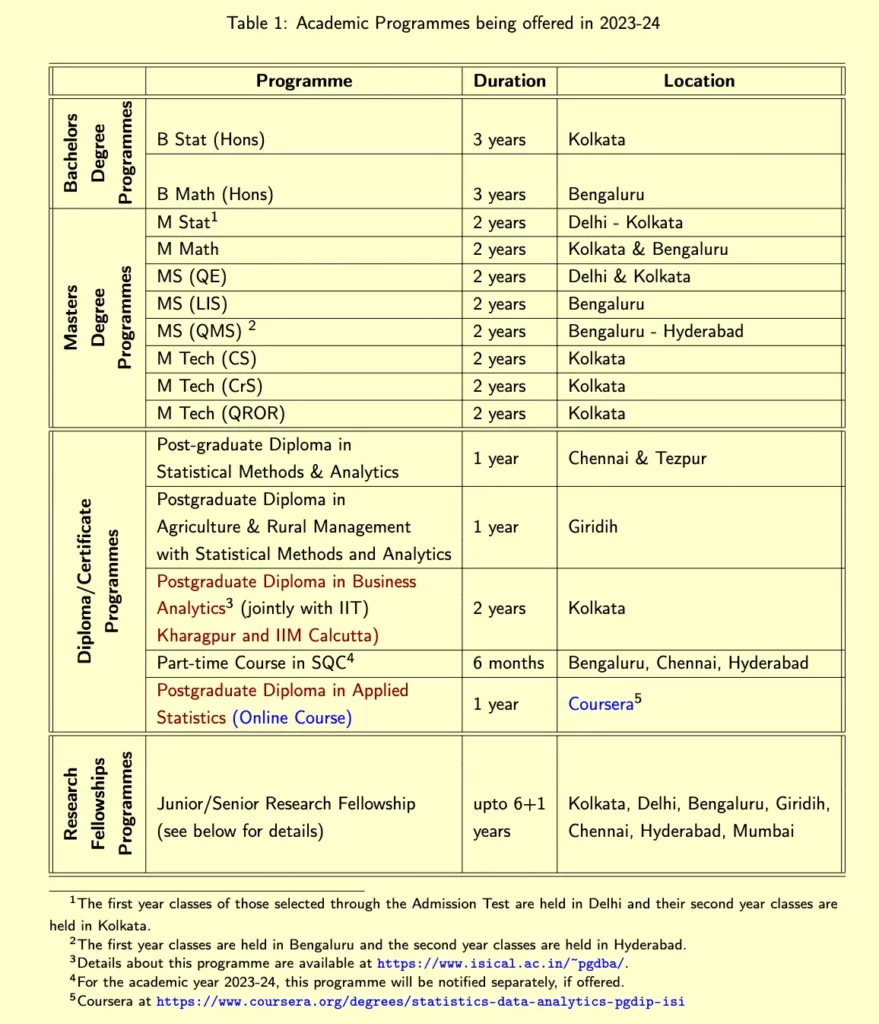
Indian Statistical Institute ( ISI ) Number of seats
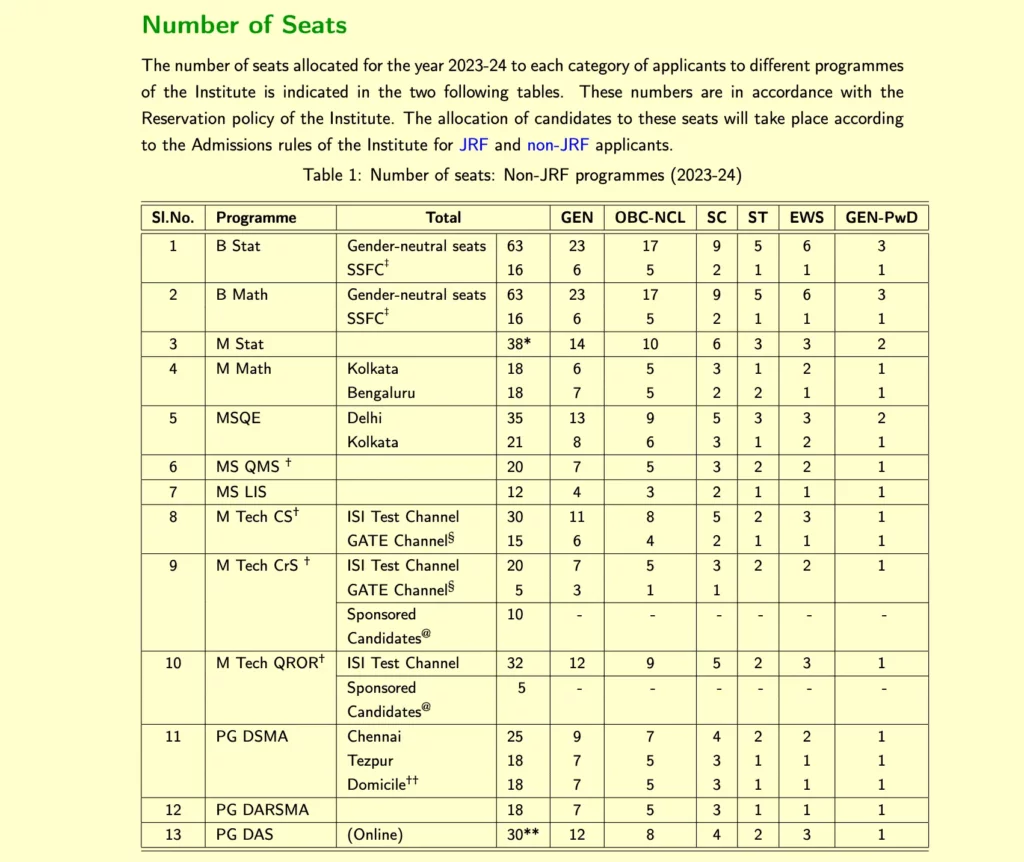
ISI Admission Test 2025 Eligibility Criteria
The eligibility criteria as stated below for each of the academic programmes offered at ISI-Kolkata reflect only the minimum requirements in order to apply for a particular programme. Only satisfying the eligibility conditions does not guarantee admission/selection into the chosen programme. For all the programmes described below, those who have completed or are due to complete their qualifying examinations for which the results are not yet published may also apply for admission.
If selected, the admission of the candidate will be provisional and pending till the announcement of results. In such cases, however, the application of the candidate is also subjected to cancellation if the final examinations are not completed/failed as on or before the due date.
| Courses | Eligibility | Selection Process |
|---|---|---|
| B Stat(Hons) B Math(Hons) | An applicant must have successfully completed +2 with Mathematics and English as subjects. | All applicants except the INMO AWARDEES will have to appear for two written tests comprising of questions at the 10+2 level. And then for the interviews. |
| M Stat | An applicant must have a three-year Bachelor’s degree or a BE/B Tech degree with Statistics as a subject, or a B Math degree from ISI, or a Post-Graduate Diploma in Statistical Methods from ISI. | The candidates will have to go through the regular admission process with the written test and interview. |
| M Math | An applicant must have a three year Bachelor’s degree in Mathematics, or a BE/B Tech Degree, with Mathematics as a subject, or a B Stat degree from ISI. | The candidates with B Math (Pass) degree from ISI, will have to appear for the written admission tests and subsequent interview. |
| MS in Quantitative Economics MS (QE) | An applicant must have a three-year Bachelor’s degree in Economics/ Mathematics/ Statistics/ Physics, or a B Stat degree from ISI, or a BE/ B Tech degree or any other qualification considered equivalent (such as AMIE). | Candidates will have to appear for the written tests and subsequent interview. Academic records may also be taken into consideration. |
| MS in Quality Management Science MS (QMS) | An applicant must have a three-year Bachelor’s degree with Mathematics as a subject or a BE/ BTech degree. | Candidates will have to appear for the written tests and subsequent interview. Academic records may also be taken into consideration. |
| MS in Library and Information Science[MS (LIS) | An applicant must have a three-year Bachelor’s degree in any discipline. | Candidates will have to appear for the written tests and subsequent interview. Academic records may also be taken into consideration. |
| PGD in Statistical Methods & Analytics | An applicant must have a domicile certificate of North-Eastern states from a recognised authority and has one of the following: a three-year Bachelor’s Degree in any discipline with Mathematics as a subject; OR a BE/B Tech degree or any other qualification considered equivalent (such as AMIE). | Candidates will have to appear for the written tests and subsequent interview. Academic records may also be taken into consideration. |
| PGD in computer applications | An applicant must have a three-year Bachelor’s Degree in any discipline with Mathematics as a subject. | Candidates will have to appear for the written tests and subsequent interview. Academic records may also be taken into consideration. |
Top engineering Exams in India – Apply Now
| Nit Details | Top Private College | IIIT Details | Government College Details | IIT Details | Gfti Details |
|---|---|---|---|---|---|
| Click | Click | Click | Click | Click | Click |
Indian Statistical Institute UG and PG Admission 2025
ISI offers B.Stat and B. Math programs at undergraduate levels. The duration of these programs is 3 years. At Postgraduate levels ISI, Kolkata offers M.Stat, M. Math, M.Tech and MS courses in multiple specializations. Duration of these programs is 2 years. Interested candidates can check the detailed eligibility and conducted centre in the table given below:
| Course | Eligibility | Centre |
|---|---|---|
| B.Stat (Hons) (3 Years) | 10+2 years of Higher Secondary Education (or its equivalent) with Mathematics and English as subjects. | Kolkata |
| B.Math (Hons) (3 Years) | Bengaluru | |
| M.Stat (2 Years) | Three-year Bachelor’s degree or a BE/B Tech degree with Statistics as a subject. Or B.Math degree from ISI. Or Post-Graduate Diploma in Statistical Methods and Analytics from ISI. | Delhi |
| M.Math (2 Years) | Three year Bachelor’s degree in Mathematics. Or BE/B Tech Degree with Mathematics as a subject. Or B.Stat degree from ISI. | Bengaluru |
| MS (QE) (2 Years) | Bachelor’s degree (of at least 3-year duration) in any discipline. Or Passed the 12th standard examination with Mathematics as a subject. | Delhi & Kolkata |
| MS (QMS) (2 Years) | Three-year Bachelor’s degree with Mathematics as a subject. Or BE/ B Tech degree in any discipline | Bengaluru – Hyderabad |
| M.Tech(CS) (2 Years) | Master’s degree in Mathematics/ Statistics/ Physics/ Electronic Science/ Computer Science/ Computer Applications/ Information Technology. Or BE/ B Tech degree or any other qualification considered equivalent (such as AMIE or, GRAD-IETE or, DOEACC ’B’ Level) | Kolkata |
| M.Tech (Cryptology and Security) | ||
| M.Tech (Quality, Reliability & Operations Research) | Master’s Degree in Statistics with Physics and Chemistry at the (10+2) level. Or Master’s Degree in Mathematics with Statistics as a subject at undergraduate or postgraduate level, and Physics and Chemistry at the (10+2) level. or BE/B Tech degree or any other qualification considered equivalent (such as AMIE). |
Top engineering Exams in India – Apply Now
| Nit Details | Top Private College | IIIT Details | Government College Details | IIT Details | Gfti Details |
|---|---|---|---|---|---|
| Click | Click | Click | Click | Click | Click |
ISI, Kolkata
ISI Kolkata has a campus consisting of six addresses at 201 through 206 Barrackpore Trunk Road, Bonhooghly (Baranagar). These include a house, which was an erstwhile office of the National Sample Survey Organisation (NSSO) of India. ISI Kolkata campus is eco-friendly, as conceived by Mahalanobis. Hollow bricks that protect from heat and noise were used with minimum use of reinforced concrete, to avoid radiation. There was no use of bitumen-basalt combination at the roads inside ISI campuses. This helps in reduction of radiation and preservation of rain water to maintain equilibrium in ground-water level.
ISI Kolkata Highlights
| Established | Type | 1931 | Public |
| Approved by | AICTE |
| Accredited by | MOSPI |
| Campus Size | 30 Acre |
| Admission Criteria | Entrance Exam and Interview Process |
| Courses Offered | UG, PG, Research Courses, Diploma Courses |
| Top Recruiters | AIG, American Express, ANZ, Axis Bank, etc. |
| Facilities Available | Hostel, Auditorium, Computer Lab, Canteen |
| Official Website | https://web.isical.ac.in/ |
ISI Kolkata Placements
The institute has a well-established placement cell that ensures that the placement process is conducted smoothly. ISI Kolkata placement cell organises various workshops and seminars to develop the communication skills and overall personality of the students. The cell also arranges mock tests and practice session classes on aptitude, quantitative ability, logical and reasoning to prepare students for the final rounds.
According to the ISI Kolkata placement brochure 2022-23, the highest and average CTC offered to students was Rs. 89 LPA and Rs. 25.5 LPA respectively. The median CTC offered to Indian Statistical Institute Kolkata students was Rs. 20 LPA to 30LPA depending upon courses. Students received job offers from various sectors such as BFSI, Trading, Consulting, Healthcare, Advertisement etc. The highest salary package offered to M.Stats students was Rs. 89 LPA in 2023.
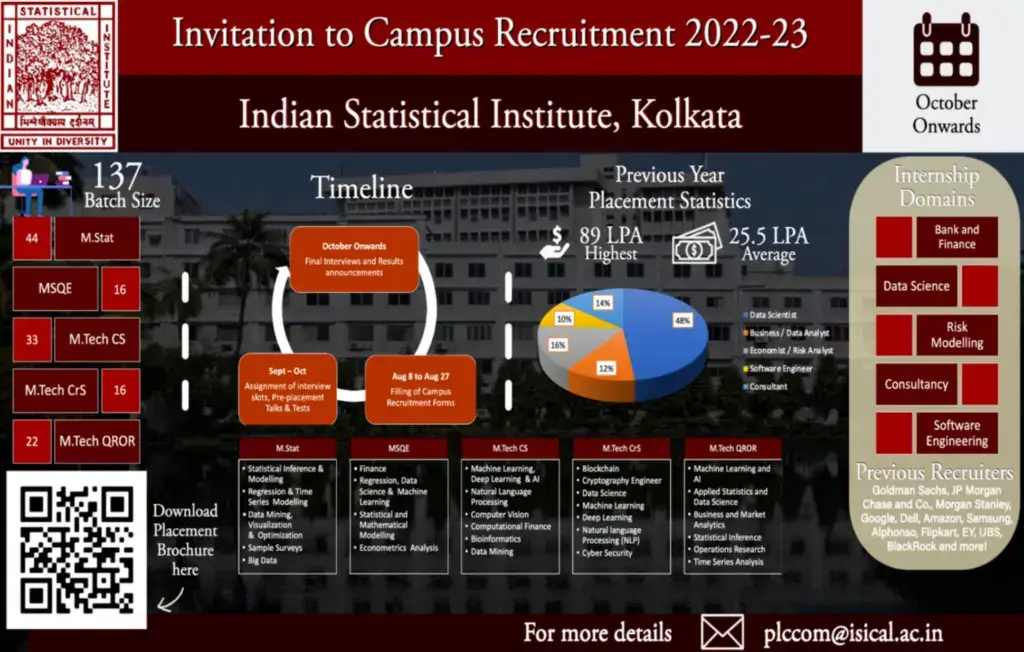
| Courses | Median Salary | Avg Salary | Highest Salary |
|---|---|---|---|
| Mtech CS | 22 lpa | 25.2 lpa | 89 lpa |
| M.Stats | 30 lpa | 28.7 lpa | 44 lpa |
| MS ( QE ) | 26 lpa | 29 lpa | 51 lpa |
| Mtech ( CRS ) | 20 lpa | 25.3 lpa | 58.7 lpa |
| Mtech ( QROR ) | 18 lpa | 19 lpa | 34 lpa |
ISI Delhi
Indian Statistical Institute, Delhi (ISI Delhi) is an institute of worldwide repute offering 2 postgraduate and 1 doctoral program under different specializations. Since its inception, it is known for its proactive on-campus placement program. Admission to the courses is done through an entrance test conducted at the Insitute level.
Established in 1974, it enjoys a good reputation for M.Stat., M.Sc. and Certificate. course in Statistics, Statistics, Business Analytics, Six Sigma. Students can do full-time course from the Institute located in Delhi. The Institute provides 2 PG Degree and Certificate courses. It has decades of experience that has been built through its excellent, experienced faculty dedicated to imparting quality skills through a syllabus that is at par with industry trends.
The institute also has well-equipped Library, Boys Hostel, Girls Hostel, Labs. with all modern facilities. This infrastructure is supported with various seminars and workshops that help students learn about new trends and topics as well as interact with experts in respective fields.
Top engineering Exams in India – Apply Now
| Nit Details | Top Private College | IIIT Details | Government College Details | IIT Details | Gfti Details |
|---|---|---|---|---|---|
| Click | Click | Click | Click | Click | Click |
ISI Delhi Placement
The placement cell at Delhi centre enables recruitment opportunities for the students. The placement process starts in the month of August. The Institute also organizes Pre Placement Talks (PPTs) which will be followed by campus recruitment. The students will be shortlisted on the basis of academic as well as personal performance. Some of the past recruiters of the Institute include KPMG, HDFC Bank, Accenture, Cognizant, RBS, Reliance, Deloitte, ICICI Bank, Idea, Goldman Sachs, Mercados, DE Shaw & Co, etc.
The following graph shows the industry split for 2018-19 session: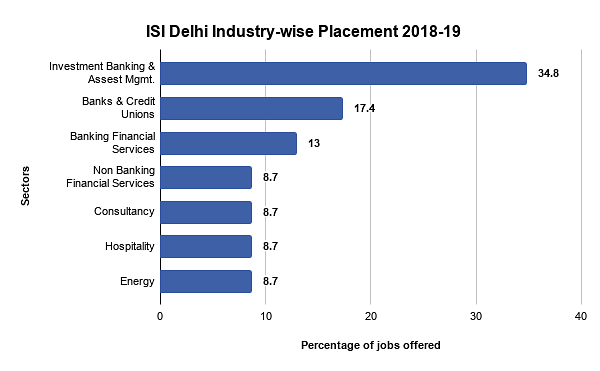
ISI Delhi Facilities
- Library: There is a collection of 33000 books, 278 journals, 550 electronic journals, 17500 bound volumes in the field of Mathematics, Statistics and Economics. It also subscribes to all major journals in print and electronic form.
- Hostels: Hostel accommodation is given on a merit-cum-need basis subject to availability. At the current time, hostel accommodation is available to all admitted students.
- Stipend: The Institute offers a stipend to all students (currently INR 5000 per month). It is valid initially for the first semester. The amount of stipend for other semesters depends on the academic performance of the student.
ISI Bangalore
Indian Statistical Institute (ISI) Bangalore, one of the four major centers of the ISI, provides undergraduate and postgraduate courses in Mathematics and Library Science.The institute is ranked 1352 worldwide according to the web rankings published by Webometrics Rankings of World Universities. It is maintained by the Ministry of Statistics and Programme Implementation (MOSPI) of the Government of India.
The Bengaluru centre of ISI started with a Statistical Quality Control and Operations Research (SQC & OR) unit in 1954. The Documentation Research and Training Centre (DRTC) here became operational from 1962 with honorary professor S. R. Ranganathan as the head. Prof. Mahalanobis planned of starting a full-fledged centre of ISI here around the mid-sixties. In 1966, the then Government of Karnataka granted ISI 30 acres of forest land full of eucalyptus trees, next to the upcoming campus of the Bangalore University, located on the Mysore Road on the outskirts of the city
ISI Bangalore Highlights
| Official website | www.isibang.ac.in |
| Courses | UG and PG |
| Admissions | ISI Admission Test |
| Mode of Registration | Online |
ISI Bangalore Placements
Students of ISI Bangalore get opportunities to join research programs in India and abroad, or get placed in attractive positions in the industry or government departments. Most of the students of the Institute get employment offers or admission to some Ph.D. programmes even before they complete the qualifying degree examinations. A prestigious multinational IT consulting and services company has signed an MoU with ISI that gives placement opportunities to successful students.
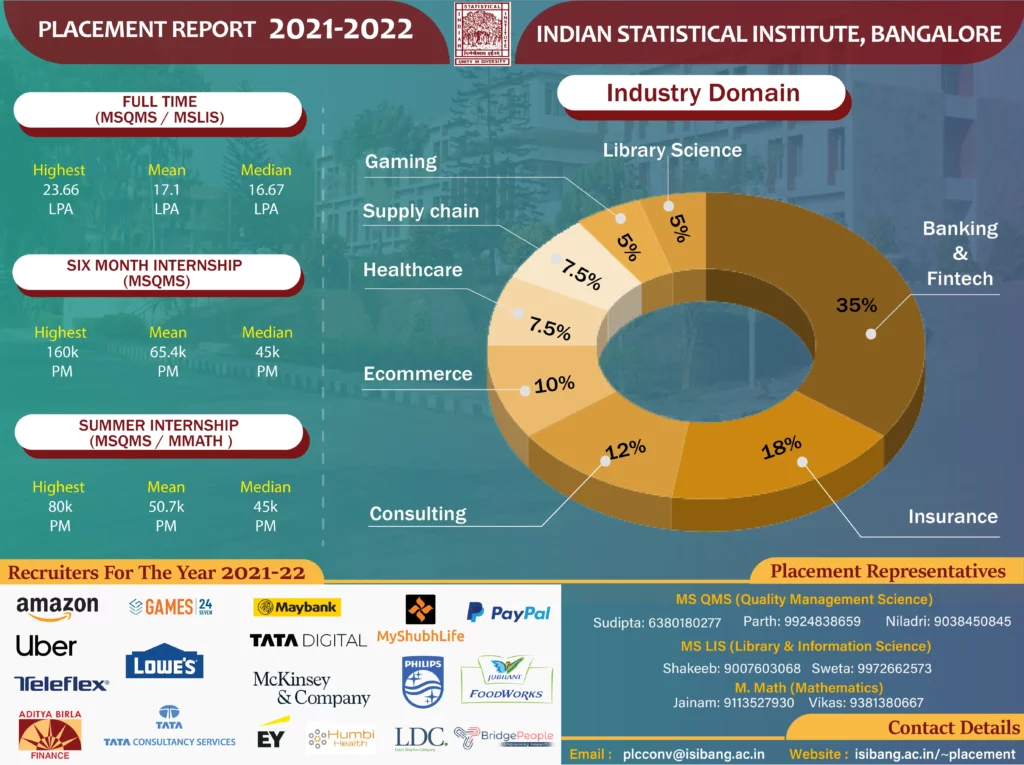
Research Divisions and Centers
| Division | Units |
|---|---|
| Applied Statistics | Applied Statistics Unit, KOLKATA Applied Statistics Unit, CHENNAI Interdisciplinary Statistical Research Unit, KOLKATA Applied and Official Statistics Unit, TEZPUR |
| Biological Sciences | Agricultural and Ecological Research Unit, KOLKATA Agricultural and Ecological Research Unit, GIRIDIH Biological Anthropology Unit, KOLKATA Human Genetics Unit, KOLKATA |
| Computer and Communication Sciences | Advanced Computing and Microelectronics Unit, KOLKATA Computer Vision and Pattern Recognition Unit, KOLKATA Cryptology and Security Research Unit, KOLKATA Computer Science Unit, CHENNAI Electronics and Communication Sciences Unit, KOLKATA Machine Intelligence Unit, KOLLKATA Documentation Research and Training Centre, BANGALORE Systems Science and Informatics Unit, BANGALORE |
| Physics and Earth Sciences | Geological Studies Unit, KOLKATA Physics and Applied Mathematics Unit, KOLKATA Theoretical and Applied Sciences Unit, TEZPUR |
| Theoretical Statistics and Mathematics | Theoretical Statistics and Mathematics Unit, KOLKATA Theoretical Statistics and Mathematics Unit, BANGALORE Theoretical Statistics and Mathematics Unit, CHENNAI Theoretical Statistics and Mathematics Unit, DELHI |
| Social Sciences | Economic Research Unit, KOLKATA Economic Analysis Unit, BANGALORE Economics and Planning Unit, DELHI Linguistic Research Unit, KOLKATA Population Studies Unit, KOLKATA Psychology Research Unit, KOLKATA Sampling and Official Statistics Unit, KOLKATA Sociological Research Unit, KOLKATA Socio-Economic Research Unit, TEZPUR Sociological Research Unit, GIRIDIH |
| Statistical Quality Control and Operations Research | SQC & OR Unit, KOLKATA SQC & OR Unit, DELHI SQC & OR Unit, BANGALORE SQC & OR Unit, CHENNAI SQC & OR Unit, MUMBAI SQC & OR Unit, PUNE SQC & OR Unit, COIMBATORE SQC & OR Unit, HYDERABAD |
Top engineering Exams in India – Apply Now
| Nit Details | Top Private College | IIIT Details | Government College Details | IIT Details | Gfti Details |
|---|---|---|---|---|---|
| Click | Click | Click | Click | Click | Click |
ISI Exam Pattern 2024-2025
The authorities have released the ISI 2023 exam pattern on the official website. Using the exam pattern of ISI 2023, candidates can know the pattern in which the question paper of ISI admission test 2023 will be prepared.
ISI Admission Test 2024 Exam Pattern – Part 1
| Particular | Details |
| Type of questions | MCQ or Descriptive |
| Subject | Mathematics of UG level |
| Total marks | 30 Marks |
| Duration | 2 Hours |
| Number of questions to attempt | It will be mandatory to attempt all the questions |
ISI Admission Test 2024 Exam Pattern – Part 2
| Particular | Details |
| Type of questions | MCQ or Descriptive |
| Sections | Questions will be from 5 sections:Computer ScienceEngineering MechanicsEngineering DrawingThermodynamicsElectrical & Electronics Engineering & Engineering and Technology |
ISI Admission Test 2024 Syllabus
Candidates are advised to carefully go through the ISI 2024 syllabus to ensure that they do not miss out to prepare on any topic. The detailed syllabus will be released by the authorities along with the brochure.
ISI Syllabus 2024 of MMA for M.Tech CS, CrS, QROR
| Analytical Reasoning | |
| Algebra | Arithmetic, geometric and harmonic progression. Continued fractions. Elementary combinatorics: Permutations and combinations, Binomial theorem. Theory of equations. Inequalities. Complex numbers and De Moivre’s theorem. Elementary set theory. Functions and relations. Elementary number theory: Divisibility, Congruences, Primality. Algebra of matrices. Determinant, rank and inverse of a matrix. Solutions of linear equations. Eigenvalues and eigenvectors of matrices. Simple properties of a group. |
| Coordinate Geometry | Straight lines, circles, parabolas, ellipses and hyperbolas |
| Calculus | Sequences and series: Power series, Taylor and Maclaurin series. Limits and continuity of functions of one variable. Differentiation and integration of functions of one variable with applications. Definite integrals. Maxima and minima. Functions of several variables – limits, continuity, differentiability. Double integrals and their applications. Ordinary linear differential equations. |
| Elementary discrete probability theory | Combinatorial probability, Conditional probability, Bayes theorem. Binomial and Poisson distributions. |
ISI Syllabus 2024 of PCB for M.Tech CS & CrS
| Group A | ||
| S.No. | Topics | |
| 1 | Analytical Reasoning | |
| 2 | Elementary Euclidean geometry and trigonometry | |
| 3 | Elements of set theory, Functions and relations, Permutations and combinations, Principle of inclusion and exclusion, Pigeon-hole principle | |
| 4 | Theory of equations, Inequalities | |
| 5 | Elementary number theory, divisibility, congruences, primality | |
| 6 | Determinants, matrices, solutions of linear equations, vector spaces, linear independence, dimension, rank and inverse | |
| 7 | Limits, continuity, sequences and series, differentiation and integration with applications, maxima-minima | |
| 8 | Combinatorial probability, Conditional probability, Discrete random variables and expectation, Binomial distribution | |
| Group B Mathematics | ||
| 1 | Linear algebra | vector spaces and linear transformations, direct sum, matrices and systems of linear equations, characteristic roots and characteristic vectors, Cayley Hamilton theorem, diagonalization and triangular forms, quadratic forms. |
| 2 | Abstract algebra | Groups: subgroups, products, cosets, Lagranges theorem, group homomorphism, normal subgroups and quotient groups, permutation groups, Sylow theorems. Rings and integral domains: subrings, ring homomorphism, ideals and quotient rings, prime and maximal ideals, products, Chinese remainder theorem, prime and irreducible elements, principal ideal domain, unique factorization domains. Polynomial rings: division algorithm, roots of polynomials. Fields: characteristic of a field, field extensions, finite fields. |
| 3 | Calculus and real analysis | Real numbers, limits, continuity, uniform continuity of functions, differentiability of functions of one or more variables and applications, convergence of sequences and series; indefinite integral, fundamental theorem of Calculus, Riemann integration, improper integrals, double and multiple integrals and applications, sequences and series of functions, uniform convergence, solutions of ordinary differential equations. |
| 4 | Graph Theory | Connectedness, trees, vertex coloring, planar graphs, Eulerian graphs, Hamiltonian graphs, digraphs and tournaments. |
| 5 | Combinatorics | Counting principles, Ramsey theory, binomial coefficients, recurrence relations, divide-and-conquer recurrences, recurrences involving convolution and their use in counting, Fibonacci numbers, generating functions, solving recurrence relations using generating functions |
| Statistics | ||
| 1 | Notions of sample space and probability, combinatorial probability, conditional probability, Bayes’ theorem and independence | |
| 2 | Random variable and expectation, moments, standard univariate discrete and continuous distributions, sampling distribution of statistics based on normal samples, central limit theorem, approximation of binomial to normal, Poisson law | |
| 3 | Multinomial, bivariate normal and multivariate normal distributions. | |
| 4 | Descriptive statistical measures, product-moment correlation, partial and multiple correlation. | |
| 5 | Regression – simple and multiple. | |
| 6 | Elementary theory and methods of estimation – unbiasedness, minimum variance, sufficiency, maximum likelihood method, method of moments, least squares methods. | |
| 7 | Tests of hypotheses – basic concepts and simple applications of Neyman-Pearson lemma, confidence intervals. | |
| 8 | Tests of regression, elements of non-parametric inference, contingency tables and Chi-square, ANOVA, basic designs (CRD/RBD/LSD) and their analyses, elements of factorial designs. | |
| 9 | Conventional sampling techniques, ratio and regression methods of estimation. | |
| Physics | ||
| 1 | Classical mechanics | Lagrangian and Hamiltonian formulation, symmetries and conservation laws, motion in central field of force, planetary motion, simple harmonic motion – damped, undamped and forced, special theory of relativity |
| 2 | Electrodynamics | electrostatics, magnetostatics, electromagnetic induction, self and mutual inductance, capacitance, Maxwell’s equation in free space. |
| 3 | Nonrelativistic quantum mechanics | Planck’s law, photoelectric effect, Compton effect, wave-particle duality, Heisenberg’s uncertainty principle, Schrodinger equation and applications. |
| 4 | Thermodynamics and statistical Physics | laws of thermodynamics and their consequences, thermodynamic potentials and Maxwell’s relations, chemical potential, phase equilibrium, phase space, microstates and macrostates, partition function, free energy, classical statistics. |
| 5 | Atomic and molecular physics | quantum states of an electron in an atom, Hydrogen atom spectrum, electron spin, spin-orbit coupling, fine structure, Zeeman effect. |
| 6 | Condensed matter physics | crystal classes, 2D and 3D lattice, reciprocal lattice, bonding, diffraction and structure factor, point defects and dislocations, lattice vibration, free electron theory, electron motion in periodic potential, energy bands in metals, insulators and semiconductors |
| 7 | Basic nuclear physics | nuclear properties, nuclear forces, nuclear structures, nuclear reactions, radioactive nuclear decay |
| 8 | Electronics | semiconductor physics; diodes – clipping, clamping, rectification; Zener regulated power supply, bipolar junction transistor – CC, CB, and CE configurations; transistor as a switch; amplifiers |
| 9 | Operational Amplifier and its applications | inverting & noninverting amplifiers, adder, integrator, differentiator, waveform generator, comparator, Schmidt trigger. Digital integrated circuits – NAND and NOR gates as building blocks, XOR gates, half and full adder. |
| Computer Science | ||
| 1 | Data structures | array, stack, queue, linked list, binary tree, heap, AVL tree, Btree. |
| 2 | Discrete Mathematics | recurrence relations, generating functions, graph theory – paths and cycles, connected components, trees, digraphs. |
| 3 | Programming languages | Fundamental concepts – abstract data types, procedure call and parameter passing, dynamic memory allocation, at least one of C, C++, Java and Python. |
| 4 | Design and analysis of algorithms | Asymptotic notation, searching, sorting, selection, graph traversal, minimum spanning tree. |
| 5 | Switching Theory and Logic Design | Boolean algebra, minimization of Boolean functions, combinational and sequential circuits – synthesis and design. |
| 6 | Computer organization and architecture | Number representation, computer arithmetic, memory organization, I/O organization, microprogramming, pipelining, instruction level parallelism. |
| 7 | Operating systems | Memory management, processor management, critical section problem, deadlocks, device management, file systems |
| 8 | Formal languages and automata theory | Finite automata and regular expressions, pushdown automata, context-free grammars, Turing machines, elements of undecidability |
| 9 | Database management systems | Relational model, relational algebra, relational calculus, functional dependency, normalization (up to 3rd normal form). |
| 10 | Computer networks | OSI, LAN technology – Bus/tree, Ring, Star; MAC protocols; WAN technology – circuit switching, packet switching; data communications – data encoding, routing, flow control, error detection/correction, Inter-networking, TCP/IP networking including IPv4 |
| Engineering & Technology | ||
| 1 | At least one of C, C++, Java, Python. | |
| 2 | Gravitation, moments of inertia, particle dynamics, elasticity, friction, strength of materials, surface tension and viscosity. | |
| 3 | Laws of thermodynamics and heat engines. | |
| 4 | Electrostatics, magnetostatics and electromagnetic induction | |
| 5 | Laws of electrical circuits – transient and steady state responses of resistive and reactive circuits. | |
| 6 | D.C. generators, D.C. motors, induction motors, alternators, transformers | |
| 7 | Diode circuits, bipolar junction transistors & FET devices and circuits, oscillator, operational amplifier. | |
| 8 | Boolean algebra, minimization of Boolean functions. | |
| 9 | Combinatorial and sequential circuits – multiplexer, de-multiplexer, encoder, decoder, flip-flops, registers and counters, A/D and D/A converters. | |
ISI Syllabus 2024 for M.Tech QROR (PQB)
| S.No. | Topics |
| Part 1Statistics (S1) | |
| 1 | Descriptive statistics for univariate, bivariate and multivariate data. |
| 2 | Standard univariate probability distributions [Binomial, Poisson, Normal] and their fittings, properties of distributions. Sampling distributions. |
| 3 | Theory of estimation and tests of statistical hypotheses. |
| 4 | Simple and Multiple linear regression, linear statistical models, ANOVA. |
| 5 | Principles of experimental designs and basic designs [CRD, RBD & LSD], Full factorial design, Confounding and blocking in 2k factorial designs |
| 6 | Elements of non-parametric inference. |
| 7 | Elements of categorical data analysis. |
| 8 | Sample surveys – simple random sampling with and without replacement, stratified and cluster sampling. |
| Probability (S2) | |
| 1 | Classical definition of probability and standard results on operations with events, conditional probability and independence. |
| 2 | Distributions of discrete type [Bernoulli, Binomial, Multinomial, Hypergeometric, Poisson, Geometric and Negative Binomial] and continuous type [Uniform, Exponential, Normal, Gamma, Beta] random variables and their moments. |
| 3 | Bivariate distributions (with special emphasis on bivariate normal), marginal and conditional distributions, correlation and regression. |
| 4 | Multivariate distributions, marginal and conditional distributions, regression, independence, partial and multiple correlations. |
| 5 | Order statistics [including distributions of extreme values and of sample range for uniform and exponential distributions]. |
| 6 | Distributions of functions of random variables. |
| 7 | Multivariate normal distribution [density, marginal and conditional distributions, regression]. |
| 8 | Weak law of large numbers, central limit theorem. |
| 9 | Basics of Markov chains and Poisson processes. |
| Part 2 “ Engineering StreamMathematics (E1) | |
| 1 | Quadratic equations, Roots of polynomial, AP, GP, HP, Divisibility and Prime numbers, Binomial theorem |
| 2 | Inequalities, permutation and combination, complex numbers and De Moivre’s theorem. |
| 3 | Elementary set theory, functions and relations, matrices, determinants, solutions of linear equations. |
| 4 | Trigonometry [multiple and sub-multiple angles, inverse circular functions, identities, solutions of equations, properties of triangles]. |
| 5 | Coordinate geometry (two dimensions) [straight line, circle, parabola, ellipse and hyperbola], plane geometry, Mensuration. |
| 6 | Sequences, series and their convergence and divergence, power series, limit and continuity of functions of one or more variables, differentiation and its applications, maxima and minima, integration, definite integrals areas using integrals, ordinary and partial differential equations (up to second order) |
| Engineering and Technology (E2)Engineering Mechanics and Thermodynamics | |
| 1 | Forces in plane and space, analysis of trusses, beams, columns, friction, principles of strength of materials, work-energy principle, moment of inertia, plane motion of rigid bodies, belt drivers, gearing. |
| 2 | Laws of thermodynamics, internal energy, work and heat changes, reversible changes, adiabatic changes, heat of formation, combustion, reaction, solution and dilution, entropy and free energy and maximum work function, reversible cycle and its efficiency, principles of internal combustion engines, principles of refrigeration. |
| Electrical and Electronics Engineering | |
| 1 | DC circuits, AC circuits (1-φ), energy and power relationships, transformer, DC and AC machines, concepts of control theory and applications. |
| 2 | Network analysis, 2 port network, transmission lines, elementary electronics (including amplifiers, oscillators, op-amp circuits), analog and digital electronic circuits, basics of computer architecture. |
| Engineering Drawing | |
| 1 | Concept of projection, point projection, line projection, plan, elevation, sectional view (1st angle / 3rd angle) of simple mechanical objects, isometric view, dimensioning, sketch of machine parts. (Use of Set Square, compass and diagonal scale should suffice). |
Top engineering Exams in India – Apply Now
| Nit Details | Top Private College | IIIT Details | Government College Details | IIT Details | Gfti Details |
|---|---|---|---|---|---|
| Click | Click | Click | Click | Click | Click |

